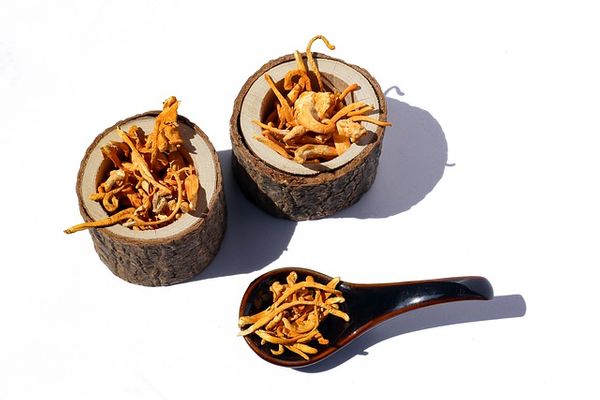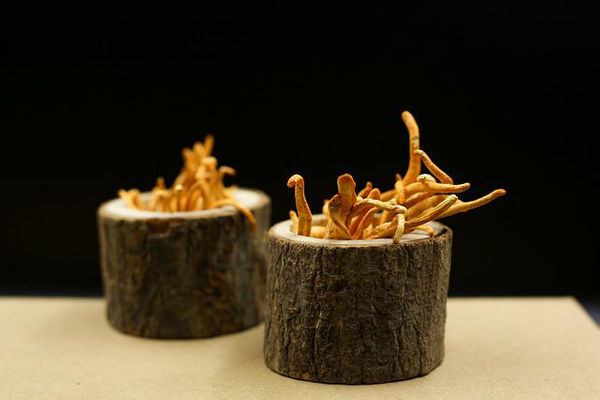The Himalayas are home to one of the most essential medicinal plants in the world that are unique to that region. Due to their scarcity and exceptional healing capacity, they are very expensive. Himalayan Keeda Jadi or Cordyceps Sinensis is a fungus that can only be extracted from specific caterpillars that are found in high-altitude mountain regions. It is one of the most precious biological resources and is also referred as Caterpillar Fungus in English and Yartsa Gungu in Sikkim.
The name Cordyceps, which means “club fungus,” is derived from the Latin words “cord” and “ceps,” which mean, respectively, “club” and “head.” Let’s check out the various Keeda Jadi benefits, the health uses of Kida Jari aka Cordyceps and the nutritional value
Nutritional value of Himalayan Kira Jadi aka Cordyceps
Cordyceps is rich in many forms of necessary amino acids, vitamins including B1, B2, B12, and K, and different types of carbohydrates like monosaccharides and oligosaccharides along with many medicinally significant polysaccharides, proteins, sterols, nucleosides, and other trace elements. (Source 1) ( Source 2)
The reported total free amino acid content of C. militaris is 14.03 mg/g in the corpus and 69.32 mg/g in the fruiting body. Lysine, glutamic acid, proline, and threonine are only a few of the many amino acids found in the fruiting body. Unsaturated fatty acids, such as linoleic acid, which make up roughly 70% of all fatty acids, are also abundant in the fruiting body. (source )
Health Benefits of Using Cordyceps (Backed by Science)
Cordyceps Benefits in Boosting Your Exercise Performance
Cordyceps is believed to boost the production of adenosine triphosphate (ATP), a chemical essential for delivering energy to muscles. This increase in ATP may improve the body’s oxygen utilization, particularly during physical activity. (Source)
In one study, researchers tested its impact on exercise performance in 30 healthy older adults using a stationary bike. Over six weeks, participants received either a placebo or 3 grams daily of a synthetic Cordyceps strain. (source)
Keeda Jadi Benefits in Reducing Tumor Causing Cells
In recent years, there has been growing interest in cordyceps due to its potential to slow tumor progression. Researchers believe that cordyceps may possess various antitumor properties. In laboratory studies, cordyceps has been shown to inhibit the growth of several types of human cancer cells, including those associated with lung, colon, skin, and liver cancers. Additionally, studies conducted on mice have demonstrated that cordyceps exhibits antitumor effects against lung cancer, lymphoma, and melanoma. (source 1), (source 2)
Also Read: Everything You Wanted to Know about Swiss Cancer League (Krebsliga Schweiz) – Switzerland
Health Benefits of Cordiceps: Cordyceps Helps in Treating Type 2 Diabetes
A special type of sugar found in cordyceps may help in managing diabetes. Diabetes occurs when your body either produces insufficient insulin or cannot effectively use it. Insulin is the hormone responsible for transporting glucose, a form of sugar, into your cells to provide energy. When the body doesn’t produce enough insulin or fails to use it properly, glucose stays in the bloodstream instead of entering the cells. This excess glucose in the blood can lead to serious health problems over time.

As a result, it’s important for diabetics to maintain tight control over their blood sugar levels. It’s interesting to note that Cordyceps works similarly to insulin in regulating blood sugar levels. As per research, Cordyceps helps in reducing or balancing the level of sugar in the body. (source 1), (source 2)
Also Read: What are the Common Health Problems Caused by Diabetes
Keeda Jadi Benefits by Working as an Anti-aging Source to Increase Strength
Cordyceps has traditionally been used by the elderly to boost sex drive, enhance strength, and combat fatigue. Researchers suggest that its anti-aging effects may be due to its high antioxidant content. Studies have shown that cordyceps can increase antioxidant levels in older mice, leading to improvements in cognitive function and sexual health. (Source )

Free radicals, which can otherwise lead to disease and aging, are neutralized by antioxidant molecules, which prevent cell damage. (source )
Also Read: Shilajit Healing Benefits: Health Facts, Precaution and Side-Effects
Cordyceps Keeps your Heart Healthy
The advantages of the mushrooms are becoming more and more clear as new research on Cordyceps and heart health emerges. In fact, cordyceps has been given the go-ahead in China to treat arrhythmia, a disorder characterized by an irregular, rapid, or excessive heartbeat.

In rats with chronic kidney illness, a research indicated that cordyceps dramatically reduced heart damage. Reducing these injuries may help prevent heart failure because it is believed that heart injuries from chronic renal disease increase the risk of heart failure. The adenosine concentration of Cordyceps, according to the researchers, is what caused these results. A naturally occurring substance called adenosine has heart-protective properties. (Source 1 ), (Source 2)
Moreover, by stimulating immune system cells and certain molecules, cordyceps may enhance immunity. Besides, when it comes to lung or skin malignancies, it may also aid in the fight against cancer cells and reduce tumor size. Natural cordyceps are very expensive.
Precautions before Using Cordyceps aka Kida Jari, Keera Jari
When taken orally, cordyceps is generally considered safe for most people at doses of 3-6 grams per day for up to a year. Some mild side effects may occur, including constipation, diarrhea, and stomach discomfort.

Breast-feeding and pregnancy: There isn’t enough reliable information to confirm whether cordyceps is safe to use during pregnancy or breastfeeding, nor what potential side effects it may have. To be cautious, it’s best to avoid using it during these times..
Multiple sclerosis (MS), systemic lupus erythematosus (SLE), rheumatoid arthritis (RA), or other “auto-immune disorders”: Taking cordyceps orally may stimulate the immune system, potentially worsening symptoms of autoimmune conditions. If you have any of these disorders, it’s recommended to avoid using cordyceps..
Side effects of using Cordiceps aka Himalayan Keeda Jadi
There hasn’t been extensive human research on the safety of cordyceps. However, its long history of use in Traditional Chinese Medicine suggests that it is generally safe. In fact, Cordyceps CS-4 has been approved by the Chinese government as a natural medicine for use in hospitals. (source )





